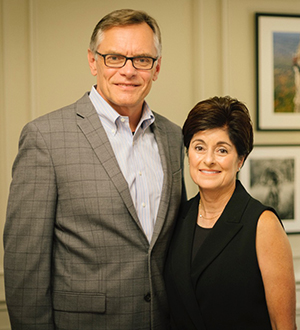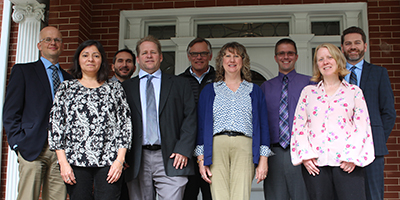Major Gift to Albion College Will Transform U.S. Pre-Medical Education
Related Posts
Connect With Us
The Wilson Institute for Medicine, created through a $5.1 million gift from Lisa and James Wilson, ’79 ’77, will empower faculty across disciplines to meet head-on the rapidly evolving medical-school landscape. Through updates and enhancements to the curriculum, Albion will be at the vanguard of American pre-med programs.
October 8, 2018
With medical education’s significant changes in the 21st century—recalibrating to give increased emphasis to the discipline’s universal human and social aspects—there is growing concern in the field that the core pre-medical curriculum, virtually unchanged for decades, must similarly adapt.
Some say the need is urgent. And a major gift to Albion College will put the liberal arts institution out in front nationally, leading the way in closing the undergraduate preparation gap.

Dr. James Wilson, ’77, and Lisa Wilson, ’79
In what amounts to a $5.1 million statement, Dr. James Wilson, ’77, and Lisa Wilson, ’79, have established the Lisa and James Wilson Institute for Medicine at Albion College. It’s the largest gift by an individual or couple in the history of the College, which quickly has seen a distinct goal emerge on campus as it forms plans and action steps for the months and years ahead.
“It’s time for us to once again take the lead in innovating pre-medical education,” said Dr. Mauri Ditzler, president of Albion College. “Medical schools have changed dramatically in the last decade. We need to make certain that pre-medical education keeps up with that. We’ve always been a leader in this field; it’s time for us to be a role model.”
An evolution from the former Institute for Healthcare Professions, the Wilson Institute for Medicine will rethink and advance undergraduate teaching and preparation so that all Albion students who aspire to become physicians can realize their dreams in a fast changing medical-education environment. Through updated and more pertinent pre-med and pre-health coursework, Albion students will have a competitive advantage in gaining entrance to top-tier medical schools and in their overall career paths.
“People have been thinking about this idea for a while, but no one has really tackled it yet,” said Dr. Bradley Rabquer, associate professor of biology and director of the Wilson Institute for Medicine. “As the MCAT has changed, as medical schools have revamped their curricula, there is this large gap at the pre-med side, in the undergraduate curriculum. So we’re really striking while the iron is hot. The opportunity now is great.”
Increasingly, medical schools are incorporating patient care and interaction—traditionally the focus of the later clinical years—into the curriculum’s first two years, which previously had been dominated by “heavy, hard sciences” according to Rabquer. Today, he said, “there is more exposure to patients earlier, an emphasis on caring for people right at the start.”
This fall, a group of 10 faculty from the departments of Anthropology and Sociology, Biology, Chemistry, Mathematics and Computer Science, Physics and Psychological Science will review changes in medical school curricula, read current literature on some of the resulting outcomes, and begin to merge those findings with current best practices in undergraduate teaching. Following that pedagogical groundwork, the professors will move into course development in the winter and spring, Rabquer said, “so that we can roll out some new integrated, novel courses in time for the fall 2019 semester.”
The Institute, and Albion’s intentions, are already being noticed at the medical-school level.
“The practice of clinical medicine has changed dramatically in the last 20 to 30 years,” said Dr. James Woolliscroft, professor of medicine and former dean of the University of Michigan Medical School. “And yet when you think about the whole preparation that students go through in their undergraduate years, it hasn’t changed that much. Prerequisites to most medical schools have remained essentially constant for over a hundred years despite dramatic changes in the practice of medicine and the scientific basis thereof.
“It’s very timely that this is being looked at and readdressed,” Woolliscroft continued. “I see Albion leading what will hopefully be a national movement of liberal arts colleges who are intent on preparing their students not for the past, but for the future.”
The gift follows several years of conversation between Albion faculty and the Wilsons, acknowledging a gap that appeared to be widening in the discipline and tapping into their passions and expertise to do something about it.
“We’re at a time in the whole ecosystem of medical schools and colleges and residency programs where this kind of change would be welcome,” said Dr. Wilson, Rose H. Weiss Orphan Disease Center director’s professor and director of the gene therapy program at the University of Pennsylvania’s Perelman School of Medicine. He received his M.D. and Ph.D. from the University of Michigan after graduating Phi Beta Kappa with a B.A. in chemistry from Albion. “I’m confident that the Albion College community will have the resolve and the agility to be able to move in this very different and transformative direction.”

Jim Wilson (center) stands with Albion faculty who are creating a new model for pre-med education, including (from left) Kevin Metz, associate professor and chair of chemistry; Marcella Cervantes, assistant professor of biology; Scott Melzer, professor of sociology; Ken Saville, professor and chair of biology; Karla McCavit, instructor of mathematics and computer science and director of the College’s Quantitative Studies Center; Craig Streu, associate professor of chemistry; Mareike Wieth, professor of psychological science; and Bradley Rabquer, associate professor of biology and director of the Wilson Institute for Medicine.
“Over the years, I’ve gotten to know many of the students Jim has taught who have worked in his lab, and I saw their struggles and I saw how difficult it was for them,” said Lisa Wilson, who after receiving her B.A. in economics and management from Albion worked in hospital administration for a number of years. “What I hope the Institute accomplishes is that every pre-med student at Albion College who qualifies and works really hard reaches their dream to become a doctor.”
“Our hope,” Jim added, “is that with the kind of resources we can bring and leverage to bring in other resources, we can enable this to happen.”
And Albion College, its president added, is the ideal place to fulfill the vision.
“A liberal arts college like Albion is nimble. We can make changes in a year or two that a bigger institution might take a decade to accomplish,” said Ditzler, himself a chemist by training. “The innovative work we’re doing in pre-medical education through the Wilson Institute should not be underestimated. This is a fundamental change in the way we and others will think about preparing students to become doctors. But it’s something that we’re well prepared for. The faculty and staff from all over the institution, as well as our alumni, are committed to making this work.”
Watch more about the Wilson Institute for Medicine
- Dr. Woolliscroft: Pre-Med Preparation Through the Years
- Dr. Rabquer: Revamping the Pre-Med Curriculum
- Dr. Wilson: What Medical Schools Require Today – Outlining the Challenge
- President Ditzler: A Fundamental Change
- Dr. Wilson: The Art of Medicine
Albion College is a private liberal arts college of approximately 1,550 students and is nationally recognized for its academic excellence in the liberal arts tradition, a learning-centered commitment, and a future-oriented perspective. The College is a leader in preparing students to anticipate, solve, and prevent problems in order to improve the human and global condition. Albion immerses students in the creation and processing of knowledge, and graduates skilled architects of societal change, active citizens, and future leaders. The College is dedicated to the highest quality in undergraduate education and is committed to diversity as a core institutional value.
Albion, Michigan, is a culturally diverse community in the south-central part of the state. The College recognizes the value of community, both on- and off-campus, and has invested resources in supporting the revitalization of the greater Albion community. This work offers an increasingly vibrant city around the campus that provides students with a fuller experience as they prepare to become engaged citizens in their own communities.